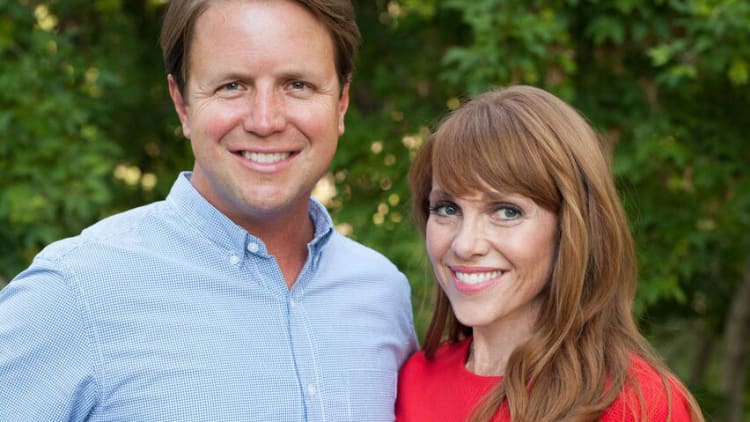Nate and Vanessa Quigley were in a position no entrepreneur ever wants to be in: They had personally invested "several hundred thousand" dollars in a company that was failing.
The duo's start-up, a family memory and photo sharing platform, just wasn't catching on. And only after they tweaked the company's business model, did it begin to generate traction.
"We literally had the wandering around the kitchen at 3 o'clock in the morning because you can't sleep because you don't know what to do and you think you're going to lose all of your investors' money. That's where we were," Nate said.
The couple knew they wanted to start a business to help people organize and share memories, but it took them two "pivots" or versions of the company to find an idea that clicked. Along the way, their start-up Folk Story would morph into Just Family and then into Chatbooks.
Fast forward to today, and they are co-founders of Chatbooks, a photo book-making company that turns users' Instagram posts into books. After every 60 posts, the service automatically print a book of them and sends it to customers' homes for $8.
To date, Chatbooks has sold more than 1 million photo books. In 2015, the company posted $5.9 million in revenue.
Even as the company has grown, it's remained a family business in many ways. Nate is the company's CEO and Vanessa is the "Chatbooker-in-Chief," a position that is a mash-up of spokeswoman, customer relations director and creative director.
Make your product effortless to use
For the Quigley family, the difference between failure and success came down to learning from the mistakes of their previous ventures.
Folk Story and Just Family laid the foundation for Chatbooks and sparked a crucial realization: People don't have time to adopt new habits.
"People are out of time and out of attention, and if your company's success depends on a bunch of people doing a new thing at the same time, it's just not going to work," Nate said.
Instead of trying to engineer a new platform, they realized they would have more success if they met users were they already were.
"Building this new platform kind of implied that people had to leave wherever they were today and start doing this new thing. And Vanessa and a couple of our board members had the insight that rather than build this new platform, we should just build a utility to add additional value the platforms that people were already using like Instagram," he said.
The mental shift was a game changer for the company, and in 2014, they pivoted to Chatbooks—a year after they thought their start-up would fail.
Listen to the important feedback
Learning to listen to what Nate calls "signals" was crucial to surviving in the early days.
"There's a certain amount of you just have to block out a lot of negative noise that comes at you, but there are also certain signals that you somehow have to not block, that you have to hear," he said. "You have to say 'Hold on, that's not just a naysayer that person is right and I want to figure out what that means for the start-up."
A signal, or important piece of feedback, could be negative or positive.
"The signal in all the noise is someone saying, 'I will pay for that tomorrow,'" he said.
For Nate and Vanessa, that signal came when Vanessa saw how much her toddler loved holding on to his photo album he got from preschool. She realized that instead of developing software for a new platform, the couple should make an existing process more enjoyable.
"It was a big 'Aha' moment," he said.
The couple asked themselves a key question: "What additional value can we give [people] with no additional effort? As soon as we kind of made that leap in our minds, it immediately took off," he said.




